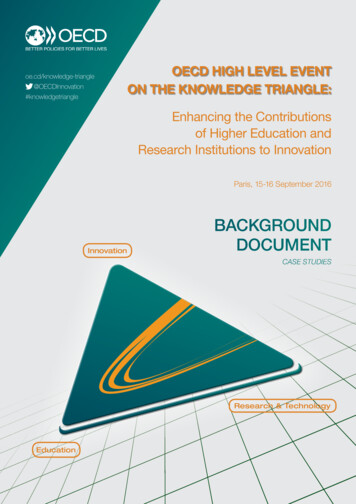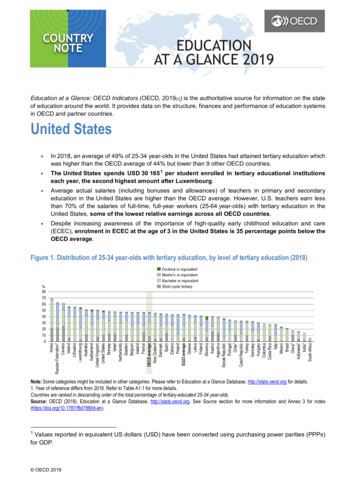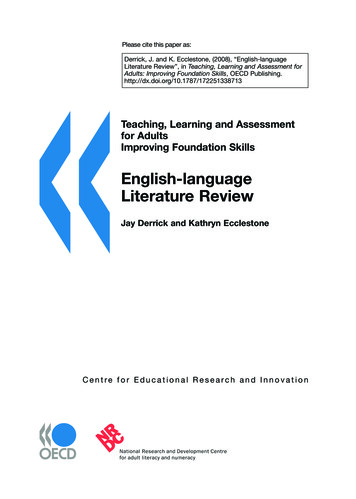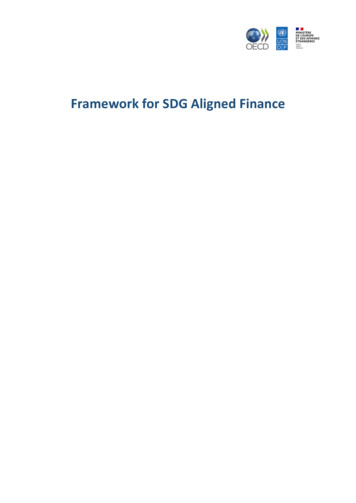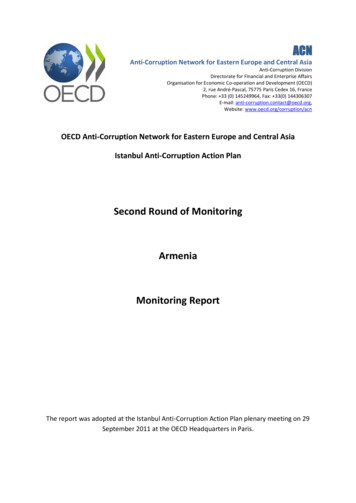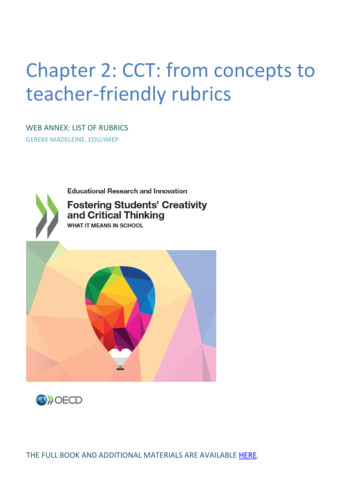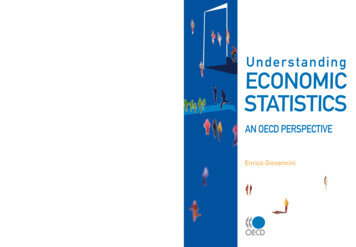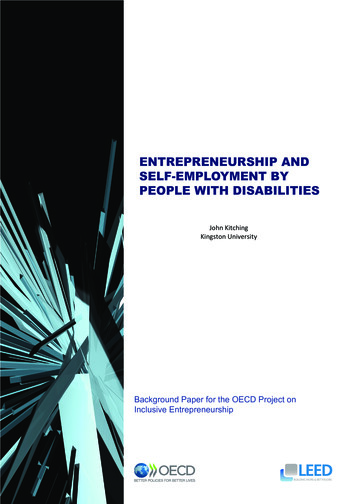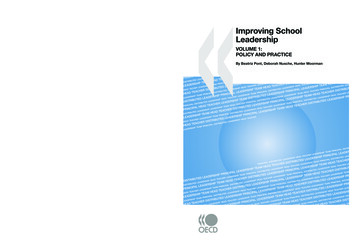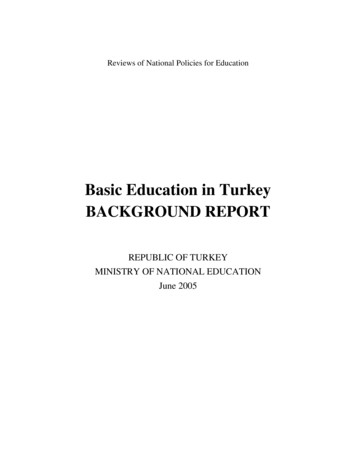
Transcription
Reviews of National Policies for EducationBasic Education in TurkeyBACKGROUND REPORTREPUBLIC OF TURKEYMINISTRY OF NATIONAL EDUCATIONJune 2005
BASIC EDUCATION IN TURKEY: BACKGROUND REPORTIn 2003, the Turkish Ministry of National Education invited the OECD Secretariat to undertake areview of Turkish basic education to evaluate the performance of the sector and recommend how itcan better meet Turkey’s strategic objectives for the future. The review was organised within theframework of the OECD’s education policy reviews. Following preparation of this Background Reportby the Turkish authorities, a team of OECD examiners visited Turkey from 1 to 8 October 2003 andprepared a report published by the OECD in 2007, Reviews of National Policies for Education: BasicEducation in Turkey (ISBN 978-92-64-03009-1).This Background Report was prepared by the Turkish Ministry of National Education to providethe examiners with background information on the historical, cultural, social, economic, institutional,and policy context of Turkish basic education. It is available at http://dx/doi.org/10.1787/10482440705and on the OECD website at www.oecd.org/edu/reviews/nationalpolicies2
BASIC EDUCATION IN TURKEY: BACKGROUND REPORTTABLE OF CONTENTSINTRODUCTION. 61. A GENERAL OVERVIEW OF HISTORICAL DEVELOPMENTS IN THE EDUCATIONALSYSTEM AND ORGANISATION . 71.1 The Changes Introduced within the Republic Period . 72. DUTIES OF THE MINISTRY OF NATIONAL EDUCATION. 103. ORGANISATIONAL STRUCTURE OF THE MINISTRY . 113.1 Central Organisation. 113.1.1 Ministerial Office . 113.1.2 Board of National Education. 113.1.3 Main Service Units. 133.1.4 Advisory and Supervisory Units . 133.1.5 Auxiliary Units. 143.1.6 Permanent Councils . 143.1.7 Specialized Commissions. 143.2 Provincial Organisation . 153.3 Overseas Organisation . 164. LEGAL FRAMEWORK OF THE TURKISH NATIONAL EDUCATION SYSTEM . 164.1 General Aims of Turkish National Education . 164.2 Specific Aims of Turkish National Education . 174.3 Basic Principles of Turkish National Education. 175. OVERALL STRUCTURE OF TURKISH NATIONAL EDUCATION SYSTEM . 215.1 Formal Education. 215.1.1 Pre-School Education. 215.1.2 Primary Education. 245.1.3 Secondary Education. 245.1.4 General High Schools . 255.1.5 Vocational and Technical High Schools . 255.1.6 Special Education. 305.1.7 Private Education . 315.1.8 Higher Education . 315.2 Non-formal Education . 315.2.1 Public Education . 345.2.2 Apprenticeship Training. 345.2.3 Distance (Open) Education . 355.2.4 Open Primary Schools. 355.2.5 Open Education High Schools . 355.2.6 Vocational and Technical Open Education High Schools . 353
BASIC EDUCATION IN TURKEY: BACKGROUND REPORT5.2.7 Open Higher Education. 366. MAIN PROBLEMS IN EDUCATION. 377. OBJECTIVES AND STRATEGIES IN EDUCATION . 377.1 Objectives in Education. 377.1.1 General Objectives . 387.1.2 Special Objectives. 387.2 Strategies in Education . 417.2.1 General Strategies . 417.2.2 Special Strategies . 428. FINANCE OF EDUCATION AND BUDGET OF THE MINISTRY OF NATIONALEDUCATION. 449. NEW APPROACHES AND LATEST DEVELOPMENTS IN EDUCATION . 489.1 Primary Education . 489.1.1 Bussed Primary Education . 489.1.2 Free Textbooks. 489.1.3 Regional Primary Boarding Schools (YİBO) and Boarding Primary Education Schools(PIO) . 499.1.4 Projects and Campaigns . 499.1.5 Basic Education Programme (BEP) . 529.1.6 Primary Education Investments . 589.2 Developments in Secondary Education . 599.3 Other Significant Projects in Primary and Secondary Education Supported by the EuropeanUnion MEDA Programme. 609.3.1 Support to Basic Education Project. 609.3.2 Project on Strengthening Vocational Education and Training System . 629.3.3 Project on Modernization of Vocational and Technical Education . 639.3.4 Secondary Education Project . 639.3.5 Educational Framework Project (Expansion of Computer Technology Classes) . 649.3.6 Democracy Education and the School Assembly Project . 649.4 Curricula . 649.5 Instructional Materials . 689.6 Information Technologies. 699.6.1 Integration of Information Technologies (IT) into Education. 699.7 Special Education Services. 719.7.1 Groups Given Special Education Services. 719.7.2 Other Special Education Services . 729.7.3 Special Education Projects. 759.7.4 Special Education in Basic Education Programme . 769.8 Guidance and Psychological Counselling Services . 769.8.1 Guidance and Research Centres (RAM) . 769.8.2 Activities in RAMs . 769.8.3 Vocational Guidance. 769.8.4 Means of Measurement and Assessment . 779.8.5 Guidance Programme. 779.8.6 Other Guidance Services. 779.8.7 Implementation Rate of Secondary Education Guidance Programme . 789.8.8 Projects for the Development of Guidance Services. 789.9 Evaluation of Student Achievement . 794
BASIC EDUCATION IN TURKEY: BACKGROUND REPORT9.9.1 International Student Assessment Projects . 799.9.2 National Measurement and Evaluation Studies . 809.10. Educational Research and Development Studies. 819.10.1 Research . 819.10.2 Development . 829.10.3 Planned School Development Model. 829.10.4 Learner Centred Education Model . 839.10.5 Developmental Counselling Model. 839.11. Adult Education . 849.11.1 Public Training. 849.11.2 Project on Mother and Child Education. 859.11.3 Five-Six Age-Mother and Child Education Programme. 859.11.4 Instructor Mother (Babysitter) Training Programme . 869.11.5 Project on Family Health Training. 869.11.6 Work on Literacy . 869.12 Teacher Training. 889.12.1 Pre-service Training . 889.12.2 In-service Training . 919.13. Educational Management and Inspection . 949.13.1 Total Quality Management Practices . 949.13.2 Management Information System . 959.13.3 Appointment of Teachers.
In 2003, the Turkish Ministry of National Education invited the OECD Secretariat to undertake a review of Turkish basic education to evaluate the performance of the sector and recommend how it can better meet Turkey’s strategic objectives for the future. The review was organised within the framework of the OECD’s education policy reviews. Following preparation of this Background Report by .


